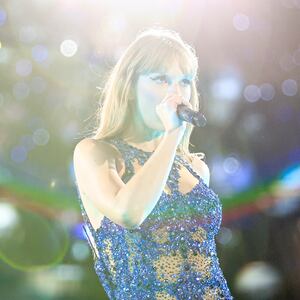Since music industry behemoth Universal Music Group (UMG) failed to reach a new licensing deal with TikTok last week, thousands of videos using UMG-owned music have been suddenly muted, as the corporation began removing its audios from the TikTok library, including the likes of Drake, Bad Bunny, and Taylor Swift.
Artists on UMG-owned labels, including Tyla, Jack Antonoff, and J Balvin have posted their reactions to the news, sharing feelings of disagreement and stressing the importance of social media in promoting their careers. “Yeah, I mean, my career is over, for sure,” Conan Gray, who gained a following through TikTokkers adapting his songs into viral audios, told Rolling Stone on the subject. “I’m never gonna have a hit song ever again at this rate. No, no, it’s fine.”
TikTok itself has echoed the artists’ concerns and frustrations. In a statement published Jan. 30, the company wrote: “TikTok has been able to reach ‘artist-first’ agreements with every other label and publisher. Clearly, Universal’s self-serving actions are not in the best interests of artists, songwriters and fans.” TikTok declined to comment further when The Daily Beast reached out.
UMG offered a counter-argument. In a statement provided to The Daily Beast, the company wrote, “As I’m sure you can understand, we must fight to protect our artists and songwriters. TikTok wants you to think that since they are giving artists ‘free promotion’ for which artists should be grateful, they have no obligation to pay them fairly. What they don’t tell you is that they are generating tens of billions of dollars of revenue from artists’ work and building the largest and most valuable social media platform in the world off their music.”
The statement signs off with an apology for the “frustrating” situation this has created for users, before concluding, “Imagine how frustrating it is to the thousands of artists and songwriters TikTok refuses to pay fairly as they rake in tens of billions of dollars.”
But the impact has spread beyond just artists and songwriters looking to further their careers—it’s also sent deep shockwaves through the various creator economy niches. Fangirls have filmed themselves falling to their knees or standing in silent salutes after realizing many of their beloved fancams have been muted. Others have posted in shock that songs from their favorite artists have vanished. “they officially removed all the lana del rey audios 😭 this umg thing is no joke,” one user wrote. “POV: me opening tiktok this morning and seeing all of my favorite edits had their audios removed,” BookTok creator @cassiesbooktok posted, alongside a video in which her face falls while looking at her phone, as she realizes what’s happened to the platform.
@sstrawberrylemonade Were you silent or were you silenced? This is so stupid and im super upset about how many of my videos are going to be muted and i cant evn imagine how the editors feel :/ #edits #umg #NOTSLAY ♬ The Maze - Aves🔮
@jarredjermaine UMG & TikTok, japanese city pop really?
♬ original sound - jarred jermaine
Mikael Arellano, creator of the popular dance set to Taylor Swift’s “Bejeweled,” made a TikTok on Feb. 1 in response to the song’s disappearance. In the video, he sings an a cappella cover of the song while doing the dance. “me now that all my bejeweled videos are about to be muted,” Arellano captioned the post. The official account for band OneRepublic commented under it. “Can you help us too,” they said.
Dancer and content creator Lars Gummer, who choreographed the viral dance to Kaliii’s “Area Codes,” started to see his videos being muted the day after the announcement. He told The Daily Beast that his first reaction was that of shock, which quickly turned into disappointment. “Most of my friends in L.A. are content creators, especially dance creators,” he said. “So immediately we all were angry about the decision made between UMG and TikTok. But at the end of the day, it’s our job. So we’re going to make it work one way or another.”
Creators are a major leg of the promotional landscape for the music industry. Gummer has worked with UMG in the past to promote specific songs, in a partnership he referred to as Song Promos. He said that within the music industry landscape, he doesn’t know how music promotion will progress without this established pillar of publicity. “I don’t see how [artists] will be able to promote their music in such a casual, organic way, and it’s a loss for both of us,” he said.
Beauty creator Sharon Wu, known as @sourandnasty on TikTok, said the impact is felt in different areas of content creation as well. She often uses popular music to reach new viewers and inspire makeup looks for her channel. “Music is a good way to increase searchability and find common ground with your audience,” she said. “At first, I wasn’t that worried about it, because there’s other artists from other labels that are still on the platform, but a lot of big artists like Taylor Swift and Olivia Rodrigo were impacted, and I realized [removing their music] could affect a lot of creators.”
Swift’s music in particular plays a big role in Wu’s own videos. One of Wu’s viral series last year was a collection of TikToks in which she created makeup looks based off of tracks from Taylor Swift’s Midnights album. The series garnered over 5.7 million views, but some videos have been muted as a result of the exodus. “A lot of people use official audios to reach a wider audience and now it feels like we have to figure out another method to make up for it,” she said. “I’m sure creators in less-related niches will just pivot to using music from non-UMG artists or unofficial audios, but this will definitely impact creators in the music industry who talk about and make music.”
@someguynameavery The day the music died…. #umg #UniversalMusicGroup #soundremoved #soundremovedfromtiktok ♬ original sound - Some Guy Avery
Dancer and content creator Jake Craig (@jakeluvsgaga) said he felt that the removal was a disservice to not just fellow creators, but the artists themselves too. “Everyone knows that TikTok is the fastest way to get viral nowadays and to reach the most people,” he said. “It’s going to be hard for creators to be able to succeed because it’s all a chain. As artists release their music on TikTok, it inspires content creators to make dances, which in turn helps their accounts grow.”
Craig emphasized that the impact goes beyond just the business end of things, as well. “A lot of the videos that I have created have been with my best friends, and really memorable times, and now it’s hard to look back at those videos with no sound,” he said. “It’s not really about the views at that point, because a lot of the videos that did get muted were from a long time ago. It’s just more about the memories that are associated with those videos.”
Already, users have begun to make memes speculating what will come next. Some have joked about replacing all audios with Glee covers or performed the songs they normally would lip sync to themselves. But even some of these options won’t work. “I was gonna make a joke saying now that all the music is gone from the artists, I’m gonna have to use Kidz Bop covers,” one said. “But all of their songs are off this app, too.”
And affected artists themselves are coming up with ideas to circumvent the removal too. Singer Beabadoobee posted a video on Feb. 3 in reaction to the news. “umg took my music off so i guess 2x it is,” she wrote in the caption. Rapper bbno$ released a new satirical remix of his TikTok-viral song “edamame,” just for the app.
“People are so creative on here,” Craig added. It’s not going to stop anyone from doing what they enjoy.”
@jerseyyjoe When UMG removed all of their sounds off of TikTok 😂 ( IB: @Haven Lough ) #jerseyyjoe #jersey #trend #viral #fyp ♬ Fluffing a Duck - Kevin MacLeod
@yourfavoriteelbow97 Should I start singing live now? 💀💀💀 #foryou#fyp#foryoupagе#poutoi#furdich#fypシ゚#3ambangers#relatable#umg#tiktokumg#tiktoksounds#nostalgia ♬ original sound - That one Multifandom poster :]
Many creators are looking forward to the potential that this era might bring. Gummer says he’s curious about the creative shifts that dance content creation might bring. “I see the landscape of dance content creation going in the direction of making dances to songs the creators actually love,” he said. “In a way, this takes the whole ‘trending audio’ aspect out of it, and leaves creators more of an opportunity to make dances to songs because they want to, not because they’re viral.”
“I am not nervous about creating content in the future,” he said. “There are so many smaller, independent artists that deserve so much recognition and praise for their craft. If there’s ever been a time to support smaller artists, it’s now.”







